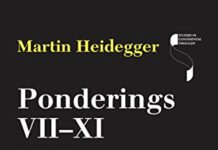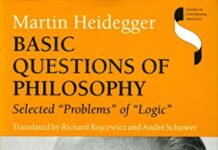
Ebook Info
- Published: 2010
- Number of pages: 283 pages
- Format: EPUB
- File Size: 2.00 MB
- Authors: Martin Heidegger
Description
“Scrupulously prepared and eminently readable,” this volume presents Heidegger’s most important lectures on religion from 1920–21 (Choice).In the early 1920s, Martin Heidegger delivered his famous lecture course, Introduction to the Phenomenology of Religion, at the University of Freiburg. He also prepared notes for a course on The Philosophical Foundations of Medieval Mysticism that was never delivered. Though he never prepared this material for publication, it represents a significant evolution in his philosophical perspective.Heidegger’s engagements with Aristotle, Neoplatonism, St. Paul, Augustine, and Martin Luther give readers a sense of what phenomenology would come to mean in the mature expression of his thought. Heidegger reveals an impressive display of theological knowledge, protecting Christian life experience from Greek philosophy and defending Paul against Nietzsche.
User’s Reviews
Reviews from Amazon users which were colected at the time this book was published on the website:
⭐I think there are at least two good reasons to read this book. First is historical, to catch a view into the development of some central insights and concepts that Heidegger later developed in Being and Time. The second is to look specifically at Heidegger’s understanding of religious experience, and the place it has in his own intellectual life.The book is made up of notes from two lecture series, and one planned lecture series.Introduction to the Phenomenology of Religion (1920-21) — composed of notes taken by attendees of the lectures. The appendix contains Heidegger’s own notes (judged almost indecipherable by the editors). These lectures take the Letters of Paul as a focus.Augustine and Neo-Platonism (1921) — composed of Heidegger’s own lecture notes, with additional notes by Heidegger in an appendix, and notes by an attendee (Oskar Becker), which pertain to discussions that went beyond Heidegger’s own prepared notes. These lectures are focused on Augustine’s Confessions, Book X.The Philosophical Foundations of Medieval Mysticism (1918-19) — composed of Heidegger’s own notes, for a lecture course never actually deliveredThose dates place these lectures very early in Heidegger’s career. It might be interesting to draw parallels between the place of these lectures in Heidegger’s development and the place of Hegel’s Early Theological Writings in his. Both show an early influence of religious concepts that later seemingly become extracted from their religious clothing and placed into a new more purely philosophical context.It was surprising to me how many concepts that become central in Being and Time, and even in Heidegger’s later philosophy, appear here: historicity, facticity, temporality, falling, authenticity, anxiety, and even Gelassenheit (translated in later writings as “releasement”). The letters of Paul provide especially good material for a discussion of significance or meaning as fundamentally historical — Heidegger introduces the concept of “enactment”, which I won’t attempt to explain fully (I can’t), but that has to do with a decisive event, that while happening in time, is determinant for all that comes after, and even re-focuses what has come before — something from which you cannot go back to ordinary life in the same way as before. Heidegger also introduces authenticity here, with a discussion similar to later ones, where he distinguishes authenticity as a “how” of living life rather than a “what” — authenticity does not remove you from the world, but the authentic person lives in the same world differently. What this difference is should always be a bit at the limit of articulation — after all, it is, as Heidegger says here, lived rather than theorized.As for Heidegger’s own understanding of religious experience, his religiosity is deeper than I had imagined. In many ways, these lectures remind me of Kierkegaard. There are some common themes, especially in the rejection of what we might call “worldly religion” — the church criticized by Kierkegaard in The Present Age. Organized, institutionalized religion is criticized by both Kierkegaard and Heidegger as religion stripped of true religious experience, with religious practices slotted in alongside and fundamentally no different from the other practices of life. In this, there is no individual, personal experience of religion, only a going along with cultural practices. Also, just as Kierkegaard came to focus on the “exception” and the recognition that each person is an “exception” whose life cannot simply be absorbed into the life of the public, Heidegger here focuses in on Augustine’s “I have made a question of myself” — a kind of existentialist manifesto arising in the middle ages.This is a challenging book — I’ve never found anything by Heidegger to be “easy”. I certainly wouldn’t recommend it in the place of any of the more core writings of Heidegger — Being and Time, The Question Concerning Technology, Discourse on Thinking, or others. But it has much that’s interesting to tell about both the evolution of Heidegger’s thought and the place of the religious in his intellectual life.
⭐We see all the elements of Being and Time rehearsed in these lectures on Paul and Augustine. Kierkegaard importantly stands in the background, from whom Heidegger cites some key sentences from Fear and Trembling. Thus, Heidegger gives a very Protestant reading of Paul and Augustine, focusing on “enactment,” which anticipates Seinskönen of BT. God as that which exceeds all noema is entirely absent. Why? Dasein cannot confront the Other, whether the Absolute Holy or the neighbor.
⭐Came on time; in good condition. Quite an amazing book. A great insight into the early Heidegger and what went ont to Being and Time.
⭐A learned and insightful account of difficult matter that has often been trivialized.The brillance of the intellegence of the analysis amazes.
⭐Not found.
⭐Not found.
Keywords
Free Download The Phenomenology of Religious Life (Studies in Continental Thought) in EPUB format
The Phenomenology of Religious Life (Studies in Continental Thought) EPUB Free Download
Download The Phenomenology of Religious Life (Studies in Continental Thought) 2010 EPUB Free
The Phenomenology of Religious Life (Studies in Continental Thought) 2010 EPUB Free Download
Download The Phenomenology of Religious Life (Studies in Continental Thought) EPUB
Free Download Ebook The Phenomenology of Religious Life (Studies in Continental Thought)




